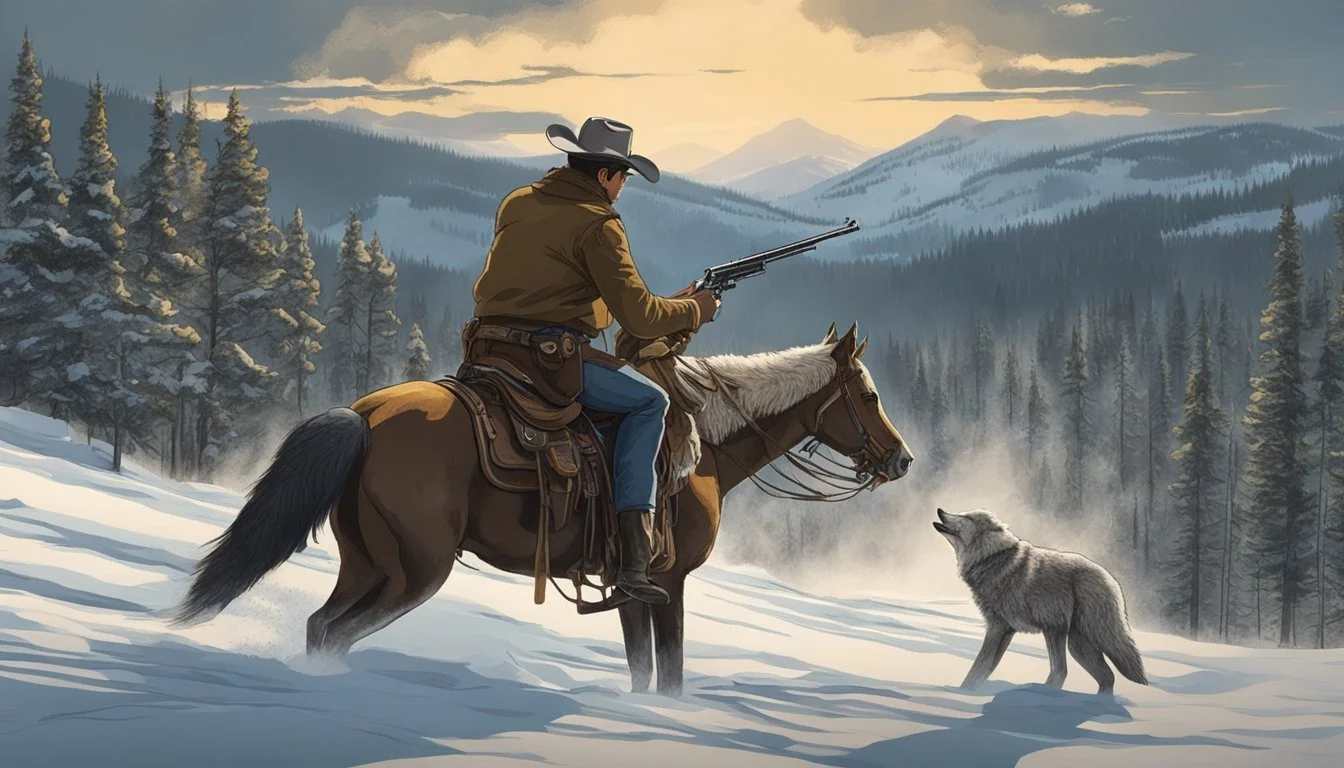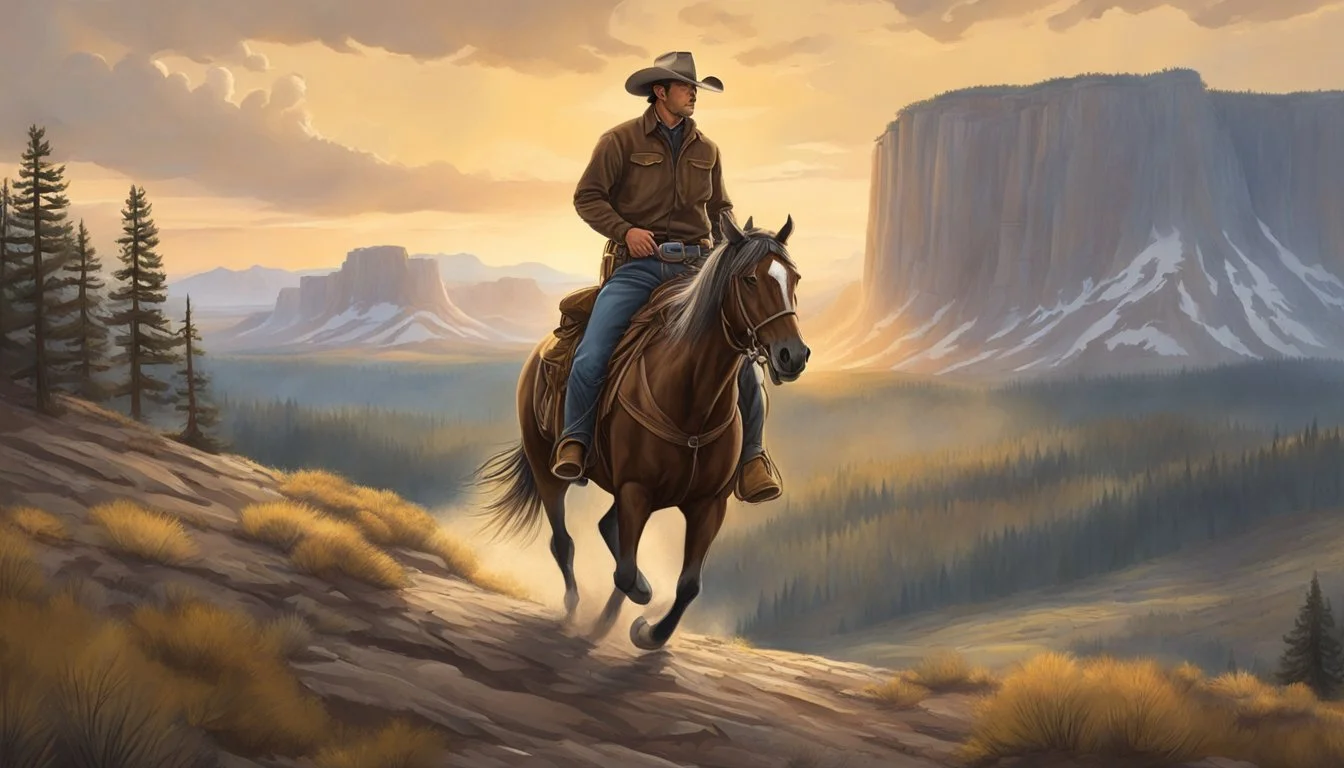Yellowstone Sparks Outrage with Disturbing Animal Killings on Screen
The hit TV series Yellowstone, starring Kevin Costner as rancher John Dutton, has faced criticism for its portrayal of animal treatment. Created by Taylor Sheridan, the show set in Montana has drawn both praise and controversy for its gritty depiction of modern Western life.
PETA accused the Yellowstone production of mutilating real cow corpses on set, sparking outrage among animal rights advocates. Paramount Network, which airs the series, denied these allegations. The show has also faced backlash from viewers over scenes depicting violence against animals, including a controversial dog-killing sequence in Season 5.
Despite these controversies, Yellowstone continues to be a ratings powerhouse. The series, which explores the conflicts between ranchers, land developers, and Native Americans, has captivated audiences with its complex characters and stunning Montana landscapes. As the show progresses, it remains to be seen how producers will balance the raw realism of ranch life with growing concerns about animal welfare.
Overview of the Yellowstone Series
Yellowstone is a popular television drama set in Montana that follows the Dutton family's struggles to maintain control of their vast ranch. The series explores themes of power, family loyalty, and the clash between modern and traditional ways of life in the American West.
Plot and Setting
Yellowstone takes place on the fictional Yellowstone Dutton Ranch, the largest contiguous ranch in the United States. The show depicts the constant conflicts between the Dutton family, land developers, an Indian reservation, and the nearby Yellowstone National Park.
The series showcases breathtaking Montana landscapes while delving into complex political and social issues. Land disputes, resource conflicts, and family dynamics drive much of the drama. The show's creators blend elements of classic Westerns with contemporary themes, creating a unique viewing experience.
Main Characters and Cast
Kevin Costner stars as John Dutton, the patriarch of the Dutton family and owner of the Yellowstone Ranch. His character is a shrewd businessman and rancher determined to protect his family's legacy at all costs.
Other key cast members include:
Luke Grimes as Kayce Dutton, John's son
Kelly Reilly as Beth Dutton, John's daughter
Wes Bentley as Jamie Dutton, John's adopted son
Cole Hauser as Rip Wheeler, the ranch foreman
These characters navigate complex relationships and face numerous challenges throughout the series, adding depth to the show's storylines.
Critical Reception
Yellowstone has garnered a significant following since its premiere on the Paramount Network in 2018. Critics praise the show's production values, stunning cinematography, and strong performances, particularly from Kevin Costner.
The series has received mixed reviews for its portrayal of contemporary issues in the American West. Some critics applaud its exploration of complex themes, while others argue it sometimes relies on stereotypes.
Despite varying critical opinions, Yellowstone has maintained a devoted fan base and consistently high viewership ratings. The show's popularity has led to the creation of spin-off series, further expanding its universe.
Yellowstone's Depiction of Animal Welfare
Yellowstone portrays animal welfare issues through its characters' interactions with livestock and wildlife. The show presents both traditional ranching practices and controversies surrounding animal treatment in rodeo events.
Animal Characters in the Show
Yellowstone features various animals as integral parts of the ranch setting. Horses play a prominent role, serving as transportation and work animals for the Dutton family and ranch hands. Cattle are central to the ranch's operations, with scenes depicting herding, branding, and other livestock management practices. Wildlife like wolves and bears also appear, highlighting conflicts between ranchers and predators in Montana.
The show doesn't shy away from depicting animal deaths. Hunting scenes and predator control measures are shown. Some viewers have expressed concern over graphic depictions of animal carcasses and killings, which the show uses to portray the realities of ranch life.
Representation of Rodeo Practices
Yellowstone includes rodeo scenes that showcase traditional Western sports. Bull riding and calf roping events are featured, giving viewers a glimpse into these competitive activities. The show depicts the skill and danger involved for human participants.
Some animal welfare advocates, including PETA, have criticized the portrayal of rodeo events. They argue that such practices can be harmful to animals. The show presents these events as part of ranch culture without explicitly commenting on animal welfare concerns.
Chief Thomas Rainwater's character occasionally offers a contrasting perspective, touching on Native American views of animal treatment. This adds complexity to the show's portrayal of human-animal relationships in Montana's ranching community.
Controversies and Viewer Reactions
Yellowstone has faced criticism and backlash over its portrayal of animal treatment. Allegations of mistreatment and controversial scenes have sparked heated debates among viewers and animal rights groups.
Allegations of Animal Mistreatment
PETA raised concerns about Yellowstone's production practices after a whistleblower reported disturbing incidents on set. The organization released an exclusive video interview with the informant, who claimed real cow carcasses were used and possibly mutilated during filming.
This revelation prompted PETA to launch a new portal, making it easier for witnesses to report animal exploitation in the entertainment industry.
Kevin Costner's series faced accusations of using and potentially harming actual animal remains for scenes. These allegations led to increased scrutiny of the show's production methods.
Social Media and Reddit Discussions
Viewers expressed outrage on social media platforms following a controversial episode featuring the killing of reservation dogs. The scene sparked intense debates on Reddit forums dedicated to the show.
Fans discussed the necessity and ethics of including such graphic content. Some defended it as realistic portrayal of rural life, while others condemned it as gratuitous violence.
The incident highlighted the show's ability to provoke strong emotional responses and ethical discussions among its audience.
Responses from Producers and Cast
In the wake of the controversies, Yellowstone's production team and cast members addressed the allegations. They emphasized their commitment to animal welfare and adherence to industry standards.
Some actors, like Gil Birmingham, weighed in on their relationship with show creator Taylor Sheridan, indirectly addressing the production's values and practices.
The show's representatives maintained that any scenes involving animals were filmed under strict supervision and in compliance with safety regulations. They urged viewers to consider the context of the storytelling while acknowledging the sensitive nature of certain portrayals.
Legal and Ethical Considerations
The use of animals in media production involves complex legal and ethical issues. Animal welfare laws, advocacy group actions, and industry regulations shape how shows like Yellowstone approach animal involvement.
Laws Governing the Use of Animals in Media
The Animal Welfare Act sets federal standards for animal treatment in entertainment. It requires licenses and inspections for animal handlers working in film and television. State laws also apply, with some places like California having stricter rules.
Productions must obtain permits to use wildlife. The American Humane Association monitors animal safety on set through its "No Animals Were Harmed" certification program.
Penalties for violations can include fines and criminal charges. Producers face legal and reputational risks if animals are mistreated.
The Role of Advocacy Groups
Organizations like PETA actively monitor animal use in entertainment. They investigate reports of mistreatment and campaign for improved practices.
PETA has specifically targeted Yellowstone, alleging animal abuse based on whistleblower accounts. The group called for a boycott of the show's second season.
Advocacy efforts have led to industry changes. Many productions now use CGI or animatronics instead of live animals when possible.
These groups also educate the public about animal welfare in media. Their campaigns can influence viewer perceptions and industry standards.
Show's Compliance with Regulations
Yellowstone's producers state they follow all applicable animal welfare laws. They work with licensed animal handlers and obtain necessary permits for wildlife scenes.
The show has not received the American Humane Association's certification. This has raised questions about their on-set practices.
Yellowstone has defended its animal treatment, claiming allegations are unfounded. They emphasize their commitment to safety and ethics in production.
Independent verification of compliance remains challenging. The lack of transparency in industry practices complicates outside assessment of animal welfare on set.
Character Analysis and Development in Context of Animal Welfare
The main characters of Yellowstone exhibit complex relationships with animals and nature. Their attitudes and actions reveal deeper aspects of their personalities and moral compasses.
Analysis of John Dutton
John Dutton's connection to the land and livestock shapes his worldview. As a rancher, he views animals primarily as property and resources to be managed.
John can be ruthless in protecting his interests, even at the expense of animal welfare. He sees predators like wolves as threats to be eliminated.
Yet he also demonstrates moments of compassion, like rescuing trapped horses. This duality highlights the internal conflicts in John's character as he balances tradition, pragmatism, and ethics.
Perspective of Rip Wheeler
Rip Wheeler embodies a rugged cowboy ethos in his approach to animals. He's skilled at handling livestock but shows little sentimentality.
Rip's harsh upbringing influences his utilitarian view of animals as tools or obstacles. He doesn't hesitate to use violence against predators or unwanted dogs on the ranch.
This attitude extends to how Rip treats people, viewing them as assets or liabilities. His loyalty to the Duttons trumps any concerns for animal or human welfare outside the ranch.
Beth and Jamie's Roles
Beth and Jamie Dutton offer contrasting perspectives on animal welfare issues. Beth's fierce personality translates to a protective instinct for vulnerable creatures.
She's shown rescuing abused horses and advocating for wildlife. This compassion provides a softer dimension to her character.
Jamie takes a more pragmatic, legalistic approach. He focuses on navigating regulations and public opinion rather than personal convictions about animal treatment.
Their differing attitudes highlight the siblings' fundamental personality clash and competing visions for the ranch's future.
Kayce and Monica
Kayce Dutton straddles two worlds in his relationship with animals. His ranching background instilled practical views on livestock management.
Yet his connection to Native American culture through Monica fosters a more spiritual bond with nature and wildlife. This tension creates internal conflict for Kayce.
Monica provides an outsider perspective, often questioning the ranch's practices. Her character highlights the ethical debates surrounding animal welfare in the modern West.
Kayce and Monica's relationship explores how differing cultural values impact views on humanity's role in nature.
Future Directions for the Show
Yellowstone's upcoming fifth season is poised to bring major developments for the Dutton family. New challenges and threats to their ranch will likely emerge as the story progresses.
Expectations for Season 5
Season 5 of Yellowstone is expected to delve deeper into the Dutton family dynamics. John Dutton will likely face increased pressure to protect his land and legacy. Beth may continue her ruthless business maneuvers to secure the family's interests.
Kayce and Monica's relationship could be tested as they balance family obligations with personal aspirations. Jamie's complicated position within the family may lead to further conflicts and difficult choices.
The show may explore new alliances and rivalries that impact the Duttons' control over their vast ranch. Environmental and political issues affecting ranching in Montana could play a larger role in the storyline.
Predicted Plot Developments
Several key plot developments are anticipated for Yellowstone's future episodes. The threat of land developers and outside business interests trying to acquire Dutton property will probably intensify.
New characters may be introduced to challenge or support the family's hold on power in the region. Long-standing feuds with neighboring ranchers or Native American tribes could reach critical turning points.
The show may reveal more about the Duttons' complex history and the origins of their vast landholdings. Flashback sequences could provide insight into pivotal moments that shaped the family's destiny.
Expect high-stakes confrontations, shocking twists, and emotional character arcs as the Duttons fight to preserve their way of life in modern Montana.





